First things first: apologies to those of you who tuned in for Commander commentary this week. I’ll return to discussing the most fun format in Magic history next time. In the meanwhile, I encourage you to continue to dig into your Commander 2018 cards and have a blast with them. This week, however, there are bigger fish than even Arixmethes, Slumbering Isle (yes, I’m aware a Kraken is not a Fish) to fry.
The Magic Pro Tour Hall of Fame ballot recently came out. I’ve been honored with a ballot since the Hall’s inception, and I’ve routinely shared my ballot with you on these very pages. This year will be no different, save for the fact that it’s going to be a little different. In the past, I’ve led with talking about the players I’m voting (and in some cases not voting) for. Occasionally, I’ve afterward offered some commentary about the Hall of Fame itself. We’re flipping the script.
Beyond Pro Players
The time has long since passed that people other than players deserve to be in the Hall of Fame. It’s the Pro Tour Hall of Fame, not the Pro Player Hall of Fame. I do not dispute that the players are the stars—just like the athletes in your favorite sport. They’re the reason that people show up to watch (I guess in the 21st century, you can watch without even showing up). They belong on the marquee, no argument.
They’re not the only people who make or have made the Pro Tour great. Like in the sport you love, writers, broadcasters, officials, executives, managers, and other positively influential characters are a part of the culture and are in the Hall. On the Baseball Hall of Fame website, they’re enshrined right alongside the players.
Mark Rosewater has made many correct decisions about Magic. His continued defense of the idea that a multiple-time offender deserving to be in the Hall is not one of them.
In Magic, what the non-players do is make the Pro Tour possible. They’re the skeleton around which the players form to make a whole body. There are a number of people who have been responsible for making the professional game into what it is, and those people deserve recognition as well.
One of the benefits of enshrinement for a player is a lifetime invitation to the Pro Tour. Non-players obviously don’t need the same thing, nor would I suggest Pro Tour invitations for anyone. I see the recognition as a benefit of its own. If you really wanted there to be a benefit, enshrinement could come with a lifetime Hall of Fame vote (although many of the people who would be so recognized already have one). Maybe the Hall of Fame ring is smaller. The bennies are not the point. Top-level recognition that professional Magic is where it is because of people who aren’t players is the point.
You might argue that there’s already a Magic Judge Hall of Fame. There certainly isn’t a Magic Broadcasters or Magic Writers Hall of Fame. And the Judge Hall isn’t in any way associated with the Pro Tour Hall. It’s a thing that the Judge Program created for itself. It’s not in any way the same. The Baseball Writers of America vote for the players in the Hall; there’s a special committee for the election of non-players, which is a worthwhile model to follow.
Here is my call to our friends at Wizards of the Coast: create a non-player section of the Pro Tour Hall of Fame. Call it a wing. An annex. An auxiliary. The name is less important than honoring the people who have done great things for our game.
Before we move on, I’ll address the idea that such a suggestion might be self-serving. I’m aware that if judges are added to the Hall, my name gets consideration. I’d ask for the more charitable reading of the situation. I would hope that a Magic career built on integrity and honesty leads you to the less cynical conclusion that my motives here are in the best interest of the game we love.
The Ballot
As I said a few years ago, I have statistical criteria which starts the conversation. There are plenty of reasons to vote for players whose numbers might not match up with others, but whose individual qualities make them a better candidate. Put another way, there’s a limit below which I’m unlikely to consider a candidate but being above the line doesn’t merit automatic selection. My current bottom level threshold is three Pro Tour Top 8s. I believe that in order to be considered one of the great players in the game’s history, one must have performed well on its greatest stage. I’ll remind you that a few years ago, I voted for Shota Yasooka although he had only two; I wasn’t the only one. He got in because he’s an absolute master.
Another thing about the number of Pro Tour Top 8s is that there are different eras of Magic, and as time goes on, some players—especially those who start out younger—have the opportunity for longer careers and thereby the ability to pile up more impressive numbers. Magic is unlike sports, in which a player has a very limited amount of time to perform at an elite level because of the physical nature of the game. Like chess, Magic players may be able to go for decades at the highest level. We may get into a situation eventually when four Top 8s is a bottom number, but I don’t think we’ve gotten that far into the future just yet. Additionally, the money is better for players these days, allowing them to compete longer. There was a time when, while being a professional Magic player was a nice aspirational goal, it was less of a reality than it is today. Many of yesteryear’s superstars (and yesteryear might be as little as even a decade ago) simply had to move on to other careers because there wasn’t enough of a living for a large number of players.
There are also intangibles which go into voting for a Hall of Fame player. We’ll discuss some specific ones with at least one of the candidates, but things like community involvement and other contributions are worthy of being considered. One of the big ones for me was what 2014 inductee Paul Rietzl called the “fear factor,” meaning the player was one of those that even the best of the other players simply didn’t want to be matched up against. If a player’s resume is one of nothing but long accumulation, I’m less likely to vote for them than someone whose very name on the other side of the pairing board caused distress.
To a somewhat lesser extent (more as a tiebreaker), I consider voting for someone if the Pro Tour would simply be better having this player around (what with the Hall conferring lifetime invitations and all). The Pro Tour is more than a competition, it’s a community. I’m a big fan of making our communities better by promoting the people which elevate that community—as well as eliminating the ones who are toxic to it (more on that later). Like evaluating which cards to ban or unban in Commander, it’s rarely a single factor that gets a player my vote, but a confluence of them.
Chris Pikula
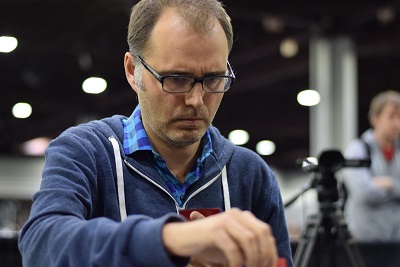
For those of you who haven’t heard me repeatedly say it, Chris Pikula was one of the great players in the Pro Tour’s early days—but his three Pro Tour Top 8s are only part of the story. He had slipped off the ballot when they changed the minimum number. He came back, re-qualified, and got those points. This still isn’t the entirety of it. In a time when judges had their hands full of cheaters in Magic, Chris led the charge to clean up the game. Without the playerbase support that Chris generated, it’s likely that I couldn’t have been as effective at helping take the game away from the cheaters and putting it into the hands of clean players. He was a trend-setter who eventually had an immense and immeasurable positive impact on the game. For this alone, he belongs in the Hall.
Mark Herberholz
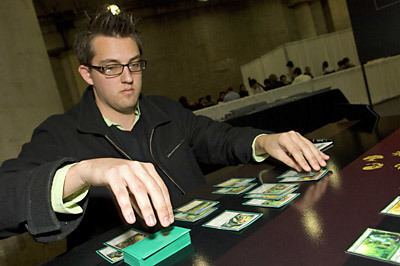
Top-flight player, top-flight writer, top-flight deckbuilder. Four Top 8s and a win. He’s absolutely the kind of personality that the Pro Tour could use more of: fun and serious at the same time, always engaging, always entertaining. Moreover, he was also an anti-cheater. As if I wasn’t already leaning this way, David Williams has been vocal in his support of Herberheezy, calling him “a master.” Early on, he was off my ballot, then back on, then off, always existing on a bit of a bubble; he’s been back on the last several years. I’m ready for the bubble to break and shoot him over the top.
Justin Gary
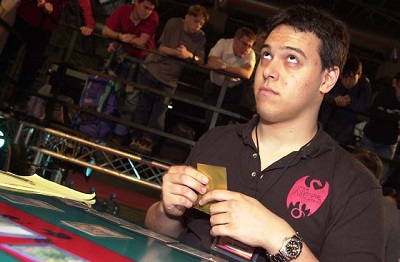
He’s going to keep getting my vote, even if I’m tilting at windmills. It’s not just the three Top 8s with one win. It’s the fact that he Top 32’d in twenty of his 44 Pro Tours, Top 64ing in four more, meaning that he was in the money in over half his starts. I continue to contend that his membership on Team Your Move Games (which yielded three other HoF’ers—four if you count Paul Rietzl, although his success came much later) might diminish his achievements for some and cost him Hall of Fame votes.
Seth Manfield
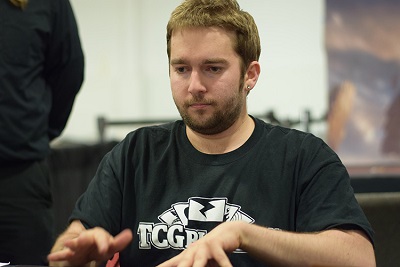
Winning a Pro Tour automatically starts people talking about eventual Hall of Fame candidacy. Winning two (and World Championships definitely count as a Pro Tour) means they start sizing the ring. He’s under my normal limit for Pro Tours at 25, but considering that he’s Top 32’d in nearly a quarter of them (8), it’s easy to set that limit aside. He also has five Grand Prix wins, to include Daytona 2007, when he was 17. He beat Paulo Vitor Damo da Rosa, a pretty fair player in his own right, in the finals of that GP, in what may go down as the youngest final table this side of Julien Nuijten (15) and Aeo Paquette (19) at Worlds 2004.
Lee Shi Tian
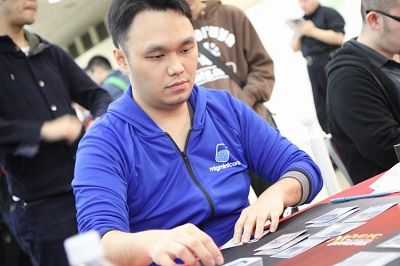
He let us know that there was a Magic scene in Hong Kong. He was just starting to become a top-flight player as my judging career was winding down, so I don’t think I directly observed him at the top of his game, but those numbers are hard to argue with. He’s right at my bottom limit of the number of PTs to be considered (for active players) at 30, but five Top 8s and three other Top 32 finishes simply cannot be denied. Especially in what I’m going to talk about below, it’s fair to address that there has been an allegation in the past about him, as covered back in 2014 by our own Patrick Chapin. I arrived at the same conclusion—sloppy, not cheaty. I did some further investigation. He has never so much as been disqualified from an event. My experience is that he isn’t the type of player to have concerns about. Serial cheaters eventually leave a trail of evidence. Sure, I suppose there’s the possibility that someone could be so amazingly good at cheating that they never get caught at anything—but that possibility is pretty remote.
Honorable Mentions
- Tsuyoshi Ikeda: Perpetual sixth place on my ballot. Maybe we can create a Hall of Honorable Mentions?
- Marijn Lybaert: Marijn would be in the HoHM as well. His three-year median of 32 is bested among clean players only by Justin Gary (there’s that name again) at 25 and Brad Nelson at 29.
- Brad Nelson: Need to give him his own line here. There was a time when he was in the argument as the hottest player in the world. Seems worth a shout-out.
Dishonorable Mentions
I’m going to say it succinctly: get the cheaters off the ballot.
I offer full-throated support to the idea that once a player has been suspended a second time, they are not eligible for the Hall of Fame. I’m willing to give everyone a chance at rehabilitation. It’s reasonable that people are allowed to continue to play after they’ve served their suspensions, even if there are multiples. Being eligible to earn the game’s highest honor? Get outta here.
Those of us on the Selection Committee can effect this change indirectly by simply not voting for them; I’d prefer to see a more systemic approach. Third Strike statutes in the USA’s legal system are actively bad, punishing a portion of the people a disproportionate amount. We’re not talking about a legal system here; we’re talking voluntary membership in an organization. If you demonstrate repeatedly that you’re not willing to follow the rules, especially to the detriment of others, the rest of us would rather you not be a member.
Mark Rosewater has made many correct decisions about Magic. His continued defense of the idea that a multiple-time offender deserving to be in the Hall is not one of them. I support Mark’s expression of his opinion, even if I disagree with it; we actually agree on fact that the person in question is a reprehensible human being. There’s no need for name-calling or hyperbolic comments. MaRo has actually articulated why he thinks it’s the case—that the Hall of Fame is about all the people who have had a large impact on the game and its history, which is where my disagreement comes in. I want the Hall to be about the people who have had a large positive impact on the game and its history. The difference is clear, and it’s okay for the two of us to not be in perfect accord. I count it good for the game of Magic that more people on the Selection Committee have agreed with me on this than with him.
Here is my call to our friends at Wizards of the Coast: create a non-player section of the Pro Tour Hall of Fame.
Speaking of cheaters, what’s with all the sketchy behavior in the Magic news these days? Are we in an upswing again of shadiness being allowed to flourish for some reason? When I retired from judging (as well as leading the penalty committee) in 2011, I believe we were at an all-time low in cheating at marquee events. We had created a culture which proactively prevented it in two ways. First, we engaged clean players in the community to create grassroots support for not associating with known suspect players. Creating trust with the player base that we were on their side (unless they were savage) led to players being comfortable enough to call us in any questionable circumstance.
Second, we created methodologies for catching and punishing cheaters when they tried to get away with stuff. Did we catch all of them? It would be naïve to think that we did. Did we engender an environment in which cheaters had trouble flourishing? Absolutely. Having not been involved over the last seven years, I can’t directly speak to what’s happened in Magic culture and the Judge program that’s let things slip. Maybe it’s nothing, just the ebb and flow of how things go. Maybe the rewards for cheating are now simply greater than the potential penalties. These are questions I can’t answer from the outside.
I could answer them from the inside—so if the call ever comes, you can bet your ass I’ll answer it.

